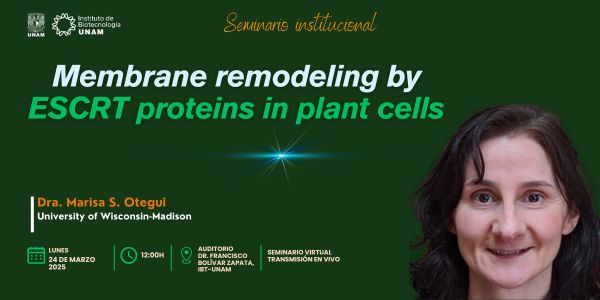
24Mar - 2025
Membrane remodeling by ESCRT proteins in plant cells
12:00 PM - 02:00 PM|Dra. Marisa S. Otegui|Center for Quantitative Cell Imaging and Department of Botany, University of Wisconsin-Madison|Invitado por: Dra. Alejandra Covarrubias
Seminario
The dynamic flow of proteins to and from the plasma membrane and between organelles is crucial for cellular function, signaling, and development. We study the cellular functions and biophysical properties of ESCRT proteins to uncover the fundamental principles governing membrane remodeling in plants and other organisms. ESCRT proteins are essential for endosomal trafficking of plasma membrane molecules as well as many other crucial cellular events. However, we are still far from understanding how ESCRTs mediate membrane remodeling in the context of all their many cellular functions. Using live imaging, electron tomography, genetics, biochemistry, structural biology, and computational modeling, we analyze endosomal membrane vesiculation in several plant lineages and other organisms to understand the common principles that underlie ESCRT membrane bending. We also have uncovered novel functions of ESCRT proteins in cell plate maturation during cytokinesis, nuclear dynamics, and epidermal cell differentiation. These findings are helping us to elucidate basic mechanisms essential for cell function and plant development, with broader implications for cell biology and plant biotechnology.
Actualizado 2025-03-18 17:22:15



